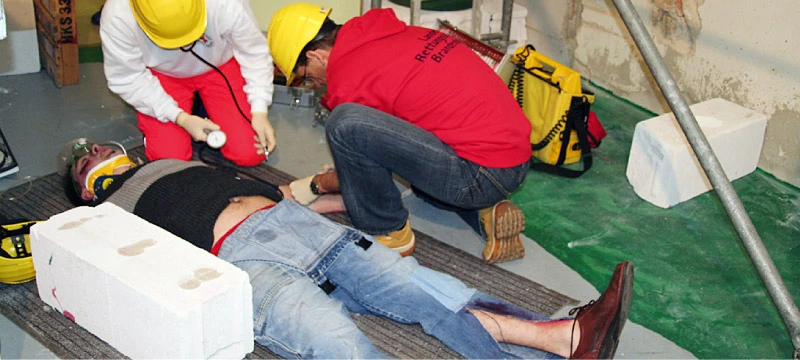Adlershof Speaks Many Languages
Viadrina sprachen GmbH have opened a branch in Adlershof
It doesn’t get any more realistic: “Language training with paramedics means keeping it together in stressful situations,” says David Furmanek, the head of viadrina sprachen GmbH. In a case of a real emergency, every mistake can have fatal consequences and so every move must be on point, every hand signal clear and the vocabulary on hand. The emergency medics train their operations in special training like the Landesrettungsschule Berlin/Brandenburg e. V. in Bad Saarow. The school has the means to simulate accidents on construction sites or in traffic and various lighting conditions. “Helping the helpers in terms of language in extreme situations is a challenge for our lecturers also,” says Furmanek.
The company viadrina sprachen has been an integral part of the applied language training of the German and Polish police. This includes German and Polish language training for cross-border operations and joint boarder offices. Furmanek makes one thing clear: “We are not a language school.” The competencies of viadrina sprachen, a subsidiary of the Viadrina European University (Oder), include communication, multilingualism, diversity management, conflict management and coaching. The courses, which can be an hour long or last for up to three years, are visited by 1,500 people every year. They offer ten languages: German as a foreign language, English, Finnish, French, Polish, Russian, Swedish, Spanish, Turkish and Ukrainian.
But what distinguishes viadrina sprachen from other language institutes? “We develop tailored programmes,” says Furmanek. Their first programme some 15 years ago was a language course for the employees of the IHP, the Leibniz-Institute for Innovative Microelectronics, aimed at expediting the integration of foreign employees into the institute. In 2000, the institute had started to strengthen internationalization and increasingly attract staff from outside of Germany. Foreign employees took part in German coursers, while the administrative staff of the institute received lessons in English.
Furmanek has identified scientific institutions like IHP and companies as viadrina’s main target group, which is why the company opened a branch in Adlershof last year. He names a postdoc going to the US for a research semester as one example, or a local researcher, who must give a presentation at an international conference. Are their language skills sufficient to do this or do they have to be improved in a brief period of time? Are they aware of locally specific language differences? Are there cultural customs they need to understand? Scientists rarely need help with technical jargon. Instead they require help with a presentation’s “skeleton” and the correct structure of a presentation in a foreign context, says Furmanek.
Through the university’s large network, Furmanek has already met many scientists from the Technology Park Adlershof. He has also won over his first Adlershof-based customer. The motives of institutions for hiring viadrina’s services are very diverse. Some view the decreasing of language barriers as a part of a culture of integration or as a way to improve a company’s “well-being and work environment”, others simply want their employees to be able to successfully communicate in a foreign language.
Teaching a language is a process. If somebody speaks several languages, learning an additional one gets easier, which David Furmanek knows from experience. The born and bred Berliner studied Russian and English at school and graduated in economics with diplomas in Dutch and in Russian. His wife is Dutch and his children are brought up bilingually. He is convinced that there is no such thing as a “lost cause” when it comes to teaching people a language. There is a wealth of methods and some people take longer than others. Furmanek is skeptical, however, when it comes to purely digital teaching methods. The lecturer as an arbiter of language and culture is essential.
By Sylvia Nitschke for Adlershof Journal
